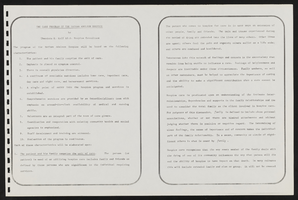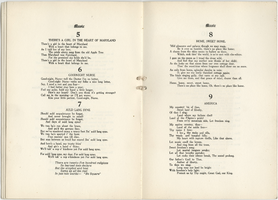Search the Special Collections and Archives Portal
Search Results

Program for the Design and Operation of The Nathan Adelson Hospice, circa 1980
Date
Archival Collection
Description
A program for the design and operation of The Nathan Adelson Hospice in Las Vegas, Nevada. Included in the program are several appendices on functions, regulations, services, and standards, along with several pages on establishing goals for the hospice. Pages near the end include hand-drawn diagrams and several monetary finance charts.
Text
Lori Lipman Brown Papers
Identifier
Abstract
The Lori Lipman Brown Papers date from 1975 to 2009 and document former Nevada State Senator Lori Lipman Brown's political career. It includes correspondence and materials from Brown's service as a Nevada State Senator from 1992 to 1994, case files from her defamation lawsuit against Nevada State Senator Kathy Augustine, and papers from her work opposing the Nevada Question 2 ballot measure on same-sex marriage in 2000. The collection also contains photocopies of biographical materials and personal and publicity photographs of Brown, as well as material from her time working with local high school and commmunity theatre programs.
Archival Collection
Ralph Denton Legal Papers
Identifier
Abstract
The Ralph Denton Legal Papers (1950-1993) consist of case files and legal briefs of civil rights attorney Ralph Denton. The cases largely involve civil rights issues and property claims in Las Vegas, Nevada. The files include cases representing individuals as well as companies such as Henderson Telephone Company, Lephrechaun Mining Company, and the Jockey Club Casino.
Archival Collection
Julius Jensen Professional Papers
Identifier
Abstract
The Julius Jensen Professional Papers (1630-1979) consist of medical research notes, medical journal reprints, manuscript and article drafts, professional and personal correspondence, business and financial records, investment information, travel information, photographic prints, art prints, and collectible books and magazines.
Archival Collection
International Food Service Executives Association Records
Identifier
Abstract
The International Food Service Executive Association (IFSEA) Records contain the organizational records from the IFSEA dating from 1916 to 2010. Included are meeting programs and minutes, menus, conference reports and proceedings, financial reports, newsletters, award certificates, scrapbooks, and stewards and caterers records focusing on the hospitality and food service industry. Materials are from both national and regional branches of the organization and include records from the United States military, with whom IFSEA has partnered with since the 1960s. Club artifacts and trophies are also contained in the collection.
Archival Collection
Robert B. Griffith Photograph Collection
Identifier
Abstract
The Robert B. Griffith Photograph Collection (approximately 1950-1970) contains black-and-white and color photographic prints, negatives, and slides of Las Vegas, Nevada including Fremont Street, Helldorado parades, and hotel and casino properties along the Strip including the Sahara Hotel and Casino, the Flamingo Las Vegas, the El Rancho, the Thunderbird Hotel and Casino, and the Hotel Last Frontier. Also included are photographs of Lake Mead Recreation Area and tunnel drilling within and near the Las Vegas Valley, Nevada. Other Nevada locations outside of Las Vegas include Reno, Virginia City, and Crystal Bay, Nevada.
Archival Collection
George Laurence Ullom Photograph Collection
Identifier
Abstract
The George Laurence Ullom Photograph Collection (1915-1974) contains photographic prints and negatives created by Las Vegas, Nevada photographer George Laurence "Larry" Ullom. Larry owned and operated Ullom’s Desert Art Studio, which was located in Las Vegas, Nevada. The bulk of the collection consists of Ullom's wedding chapel photography. The collection also includes his photography work for the Bureau of Reclamation, the Agricultural Extension Service, and the Associated Press, Atlantic News, and Acme news bureaus.
Archival Collection
Terry Wilsey Papers on the Las Vegas, Nevada LGBT Community
Identifier
Abstract
The Terry Wilsey Papers on the Las Vegas, Nevada LGBT Community (1979-2002) are comprised of records from the Las Vegas Gay Switchboard, the Nevadans for Human Rights, and other LGBT community groups based in Las Vegas, Nevada. The collection contains newsletters, agendas and meeting minutes, informational pamphlets, as well as photographs, programs, and a VHS recording of local theatre productions.
Archival Collection
Mollie Gregory Collection of Oral Histories
Identifier
Abstract
The Mollie Gregory Collection of Oral Histories contains audio interviews and brief transcripts that focus on welfare, family, and women's issues in Nevada from 1970 to 1974. Gregory interviewed Nevada residents including Maya Miller, Ruby Duncan, and Mary Wesley, who described their lives during the anti-poverty and women's rights campaigns in the early 1970s. The collection documents views on welfare; the Equal Rights Amendment; race, discrimination, and civil rights; and political campaigns.
Archival Collection

